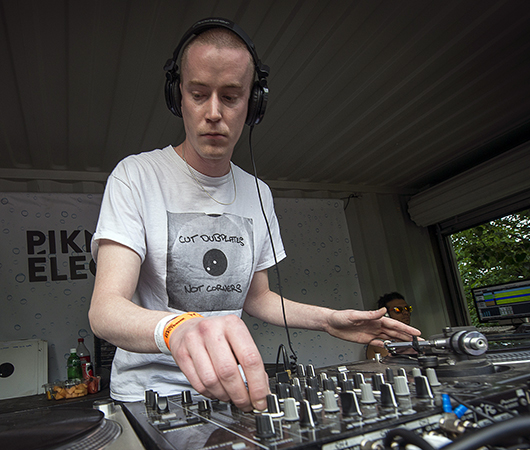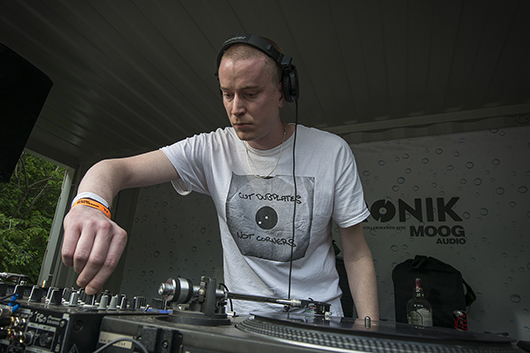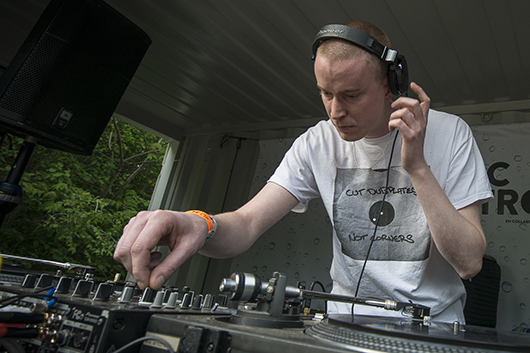Five Minutes at EM15: Pinch Discusses Collaboration, His Musical Evolution, and America’s Misunderstanding of Dubstep
In purely musical terms, MUTEK has been most closely associated with techno and the more […]

Five Minutes at EM15: Pinch Discusses Collaboration, His Musical Evolution, and America’s Misunderstanding of Dubstep
In purely musical terms, MUTEK has been most closely associated with techno and the more […]

In purely musical terms, MUTEK has been most closely associated with techno and the more experimental end of the electronic spectrum during its 15-year run, but its palette has undoubtedly widened a bit over the past few years. That trend continued with last week’s EM15 festivities, which welcomed a rather diverse array of electronic acts to Montreal. Our complete festival rundown can be found here, but we also took the time to speak with some of our favorite artists on the bill. One of them was UK dubstep stalwart Pinch (a.k.a. Rob Ellis); a few years ago, he might not have made sense on a MUTEK line-up, but the evolution of both the festival and his own musical proclivities allowed the two to happily meet in the middle. We discussed this with Ellis, and also got him talking about dubstep—and America’s misunderstanding of it—his two labels, his penchant for collaboration, and his upcoming mix CD with fellow UK producer Mumdance.
XLR8R: Is this your first time playing at MUTEK?
Pinch: Yes.
Were you familiar with the festival before?
Yeah, of course.
MUTEK is known as being more of a techno-oriented event, and that’s not necessarily the world you’re coming from…
It’s getting closer and closer.
That’s true, let’s talk about that. You started Cold Recordings last year. What made you want to start that label, especially after having Tectonic going for so long?
For me, it was roughly similar reasons as when I set up Tectonic. At the time I set up Tectonic, there were maybe two or three other dubstep labels, it was very early on. It was an outlet. There was all of this great music, I had dubplates off people—most stuff was just getting played and circulated on dub at the time. With Cold, every artist we’ve released, it’s been their debut release, they’re a young producer, it’s something different and exciting. I felt like it would be good for that sound to have a platform with its own identity. Now, I’d be lying to say that side of my influences hasn’t influenced Tectonic, because it very much has. Tectonic is always going to be the mothership, as far as I’m concerned. It’s my pride and joy. So there’s always going to be comparisons between the two and the kind of stuff that I’m putting out. In my mind, I’ve got a kind of distinction, but it’s probably not a very easily verbalized one. I guess Cold has a bit more of an incline towards techno than Tectonic, but there are no rules about it. If you ask me the same question next year, it might be upside down. We’ll see what happens with it.

You mentioned that when you started Tectonic, it was during the early days of dubstep, and the label definitely became a part of that scene. But it seems like for a few years in the UK, a lot of producers were trying to distance themselves from dubstep, because it was perceived as a passé sound. Do you think people are starting to gravitate back towards it now?
Yeah, I think things are going to have cyclical fashions. I never really distanced myself from dubstep, and to this day, I’ll still play it in sets, pretty much every set. It’s always going to be a very important part of me, and I did stick with it when everyone was jumping on the house boat. At the same time, I was also finding the half-step rhythm a little stale and I didn’t really want to kill it for myself, and I just decided it was more interesting for me to make some slower-tempo stuff. I never really wanted to make straight-up house music or straight-up techno, because I felt like we’ve gone through 30 years of geniuses doing it; you don’t need me jumping on the pile as well. I wanted to do something with the tempo, but I wanted it to have its own kind of sonic aesthetic as well. So that’s what I’ve been building on my own production side in the last few years.
But I do think that there is a bit of a resurgence, an interest if you like, in deep dubstep. In America especially, it’s getting a bit more open to that side of the thing. I guess a lot of the kids that come in through the root of Skrillex and the big sort of names, they get a little older, and then they’re looking for something that might sound a bit more refined or have a different mood about it, but where they can still relate to some of the beats. For me, it’s frustrating, because that’s what I was doing five years ago and nobody was bloody interested over here, and that’s life. No one over here is really interested in what I’m doing at the moment either. [laughs]
I’m kind of chasing my own tail a little bit. I could have done some straight dubstep shows on this trip, but I felt like I don’t want to confuse people too much and go, “in this country I’m still doing this, and this country I’m not, I’m doing this [other thing].” I feel like I want to move forward with a purposeful sense of confidence and I want to express that. I have confidence in what I’m doing, the new sound, and I haven’t abandoned [anything]. The last 12″ that came out on Tectonic was an absolutely killer deep dubstep 12″, the first one I’ve released on the label in a little while. I absolutely love it. It sold really well. There’s definitely a new generation, it’s been 9 or 10 years that we’ve been doing the dubstep thing in the UK. For me, it’s kind of a sign that the deep dubstep genre, if you like, is being recognized. I’ve used this analogy before, but I imagine this infinite rave with all of the various genre rooms. Deep dubstep has got its room now, and it’s got its place, and it’s cemented in history as far as I’m concerned, and I think that’s a wonderful thing, because it was such an important thing for me.
You been coming over and playing in North America for a while now. Do you think that America has ever properly “got” dubstep?
Fuck no! I mean, come on, I’ve released US producers on my label. I’ve worked with Distal and Grenier and some other cats as well, but for me, I was very passionate about the whole thing, but a few years ago I kind of got to the point where I just let go of it, which was better for my state of mental health. It was very frustrating. We built this sound in the UK, and it was incubated for years. I don’t think it’s possible to do that anymore; the internet is just so prevalent, people can’t keep anything secret for more than a month, and then it’s over as soon as it’s started. But we had three or four years of incubation. No one was getting paid. You only made it because you loved it, and that was the ultimate filter, as far as I’m concerned. If there’s no money in a scene, and there’s people doing it, then fuck, that means it’s a good thing. Our sound was a much deeper sound, it was more experimental with the beat patterns, it had a bit more of a tribal vibe. It was moodier, it was darker, it was a bit heads-down. I understand that maybe that sound doesn’t translate into a big arena scenario, so I guess with the elevation of it, in the way that US artists are great at doing, scaling the shows up and everything, it was inevitable. It was always going to change. For me, it really detached from the meditational vibe you could get from dubstep. And that I think is the big separation between the sounds. But America is a big country, of course there are people that do get it. They just don’t come out to the shows unfortunately.

One thing you’ve always done a lot of, especially more recently, is collaborate with other artists. You have a new mix CD, B2B, with Mumdance that’s coming out soon. What appeals to you about collaborating?
It’s hanging out with my mates in the studio, you know? That’s the honest truth. There’s a bit more to it than that. I’m less prolific on my own, because in a way, I’m always putting myself at the back of the queue. If you’re going to do a collaboration, you have to plan and arrange a time to meet up, and then you’re there, and you’re doing it. Once you’ve started something, you’re going to see it through. Also, I enjoy working with people. You can really bang a vibe off someone else. There are a lot of situations where a collaboration can be like a bad compromise, and that’s never what you want. A good compromise in a collaboration is no compromise. It’s just agreeing that this is right, and when you’ve got two sets of fine-tuned ears focusing on those ideas, it’s like, “I like that snare, but you don’t. We’ll find one that we both like.” And then, it’s cool. It’s twice as strong, maybe. That’s my philosophy on that.
What specifically made you want to do a mix CD with Mumdance?
Well, we’ve been working together since last year. The first tune we did together was “Turbo Mitzi” and that went pretty well, so it was like, “Okay, let’s do some more.” The mix CD is an opportunity to present where we’re both at in terms of the producers, the DJs, and the kind of tracks we’re selecting—it’s all upfront music. It is a B2B mix, but it’s more of a mixtape in a way, because there are a lot of new, exclusive tunes from me and Mumdance, VIP versions—I’ve done my VIP of “Legion”—and some exclusive, upfront cuts that are coming out. For me, it’s a document, like, “Here’s where were are right now. Make of it what you will.” It is a mix CD, but it’s a bit more than a mix CD in my mind.

